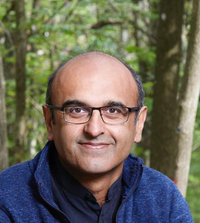报告题目:Tropical Forests and Planet Earth: A Macrosope View
主讲人:YADVINDER SINGH MALHI 教授
主持人:夏建阳 教授
讲座时间:5月20日 10:00
讲座地点:闵行校区 资环楼148
主办单位:生态与环境科学学院
报告人简介:
Yadvinder Malhi is Professor of Ecosystem Science at the University of Oxford, Jackson Research Fellow at Oriel College, Oxford and Director of the Leverhulme Centre for Nature Recovery. His research has focused on how the biosphere is responding to global change and feeds back on global change, with a particular focus on the tropics. He has extensive experience of working with partners in the tropics, notably in establishing a global network of intensive forest monitoring plots across tropical ecosystems, in sites ranging from the slopes of the Andes and Amazonia, the forests of Africa and Borneo, the savannas of Africa and the oceanic islands of the Indian and Pacific oceans. More broadly, he works on the challenges of maintaining a flourishing biosphere in the Anthropocene. Recently, in his role a Director of the Leverhulme Centre for Nature Recovery, he has also focused on the challenge of how to generate nature recovery at scale in response to the ongoing decline of biodiversity. He is a Fellow of the Royal Society, where he has chaired several of its biodiversity activities, a Trustee of the National History Museum of London, scientific advisor to several governments and Past-President of the Association for Tropical Biology and Conservation and the British Ecological Society.

报告内容简介:
The twin key environmental challenges of our times are to stabilise our climate system and reverse the decline of biodiversity. Tropical forests play an important role in addressing both these challenges. I explore what role tropical forests play in the Earth System and the interaction between tropical forests and climate change, highlighting some of my team’s recent research that combines detailed field data collection with satellite remote sensing. Field work and observations remain an essential component of understanding and stewarding our changing biosphere.